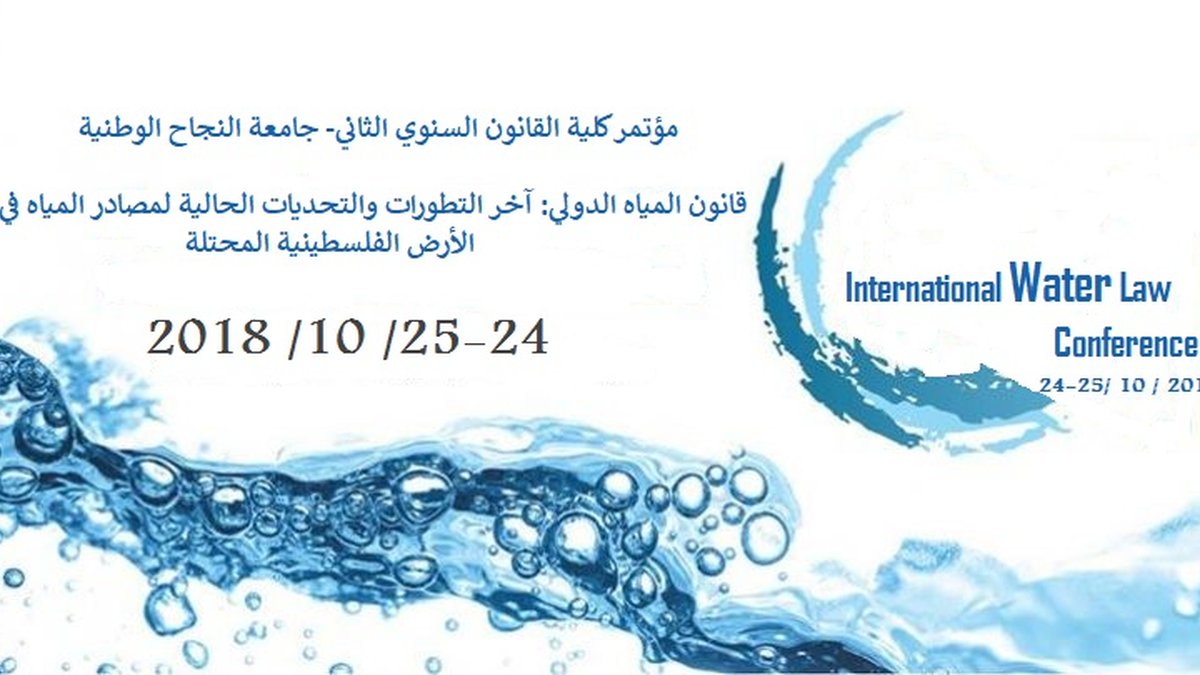
About the conference:
This conference is part of the annual conference series which are held at the faculty of law at An-Najah National University. This year’s conference will be about “International water law and current challenges of water resources in the Occupied Palestinian Territory (OPT)” and it aims at shedding light on the recent developments of International water law and the situation of water resources in the (OPT). The case of Palestinian water resources constitutes a challenge for modern principles of international water law given the political context of occupation and colonialism in the OPT. Further, water rights is one of the most contentious issues between Israel and Palestine. It was specifically left out of the Oslo accords and was supposed to be dealt with in the final status negotiation, along with other important issues such as Jerusalem, refugees and borders. However, the final status negotiation which were supposed to start in 2000 did not take place due to political tensions. Currently, water relations between Palestine and Israel are governed by interim arrangements. These arrangements are not fairly applied and do not address the question of water rights and proved inadequate to satisfy Palestinian water demands and needs. The conference will explore the issue of Palestinian water resources in light of recent developments of international water law and other related laws, in particular, international humanitarian law and human rights law.
The conference will be hosted by the faculty of law at An-Najah National University in Nablus-Palestine on the 24th and 25th of October 2018. Researchers are encouraged to submit research papers related to the themes of the conference which will be published on the faculty website and An-Najah journal or at special proceeding for the conference. Furthermore, there will be a workshop for students who wish to present papers or ideas related to the conference.
Aims of the conference:
- Shedding light on the recent developments of international water law.
- Identifying and discussing the status of water rights in Palestine both legally and technically and to find possible solutions for the obstacles that are affecting the development of the water sector.
- Structuring action plans which would raise academic and social awareness about the challenges of the water sector in Palestine to create a broad dialogue that includes universities, policy makers, and NGOs to make water concerns a priority and to enhance Palestinian water and environmental rights locally and internationally.
- Identify the obstacles and challenges that hinder the development of the water sector in Palestine, as well as the chances to develop sustainable plans to improve this sector in the prevailing political, social and economic circumstances in Palestine.
- Create a discussion platform and research centres to exchange experience, knowledge and best practises in the realm of water rights and management between policy-makers, scholars, researchers and NGOs.
- Developing support networks from individuals, institutions and NGOs that are interested in the issues of water in Palestine and beyond to support Palestinian water and environment rights.
- Raising awareness about water issues and influencing policy makers through strengthening the role of academia and civil society in participating in water and environment policies.
Themes of the conference:
- International water law (developments and contemporary issues).
- Development and sustainability of water resources (International legislations and successful practises).
- The future trend of conflict and cooperation in shared water resources management.
- Water in Humanitarian and human rights laws.
- Hydro-politics and international water law.
- The role of stakeholders in protecting water rights and accommodating international law.
Speakers:
- National and international scholars.
- National and international Policy makers.
- National and international Practitioners and experts in sustainable developments.
- NGOs.
Call for papers:
The organizing committee of the conference invites researchers to submit abstracts related to the themes of the conference. Accepted papers will be published in a special proceeding for the conference.
- Abstracts should be at least 500 words in either Arabic or English.
- Topics of the abstracts be based on any of the themes of the conference.
- Deadline for submitting abstracts is 15th of August 2018.
- The research must be original and have not been published before or accepted for publication. Researchers must adhere to scientific research criteria.
- The acceptance of papers depends on the approval of the Scientific Committee of the Conference.
Correspondences regarding the conference and submitting of abstracts should be directed to the Preparatory Committee of the conference at: Faculty of law at An-Najah National University Telefax: +970 (9) 2345113 E-mail: [email protected]
عدد القراءات: 335





